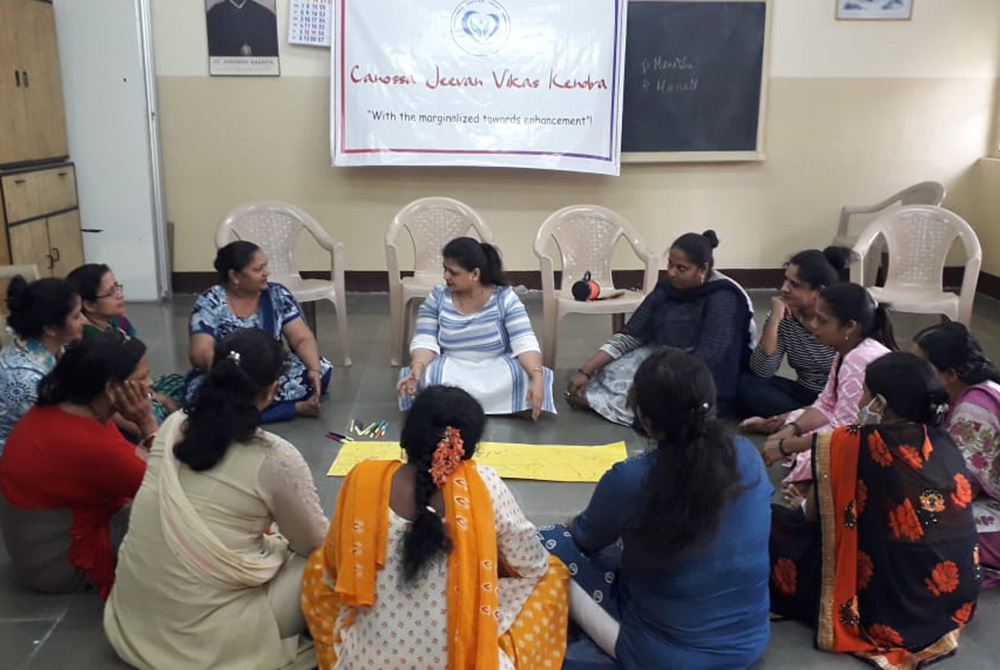
(Unsplash/Timothy Perry)
Rabindranath Tagore once remarked, "I have become my own version of an optimist. If I can't make it through one door, I'll go through another door — or I'll make a door. Something terrific will come no matter how dark the present."
This optimism is what I need today, realizing that each situation calls for a contextualized optimistic approach, especially in the lives of a vast majority of women in India who live amidst mundane daily household chores, routine jobs, love-hate relationships within their own families, discord in their relationships with extended families, and the like. How do these women then live more originally and authentically?
To live life according to the best version of one's own self requires creativity. Robert E. Franken in his Human Motivation defines creativity as the "tendency to generate or recognize ideas, alternatives, or possibilities that may be useful in solving problems, communicating with others, and entertaining ourselves and others." I think that we need to look at life from a different perspective and desire to generate better ways of thinking and acting — especially the women with whom I work, who consider themselves as limited and leashed!
As a social center team, our efforts to enhance the lives of women through workshops on creativity and related topics have been found helpful as we notice qualitative, upward progress in their levels of self-confidence in interactions, handling stress at the workplace, and tackling family matters, along with changes in their perceptual skills and entrepreneurship skills.
Margaret Boden, research professor of cognitive science at the University of Sussex and the author of The Creative Mind: Myths & Mechanisms (1990), says creativity is differentiated into three interconnected types: combinational, exploratory and transformational. Making use of these three theoretical types, I realize that not all women pass through all these three stages, as it also depends on each one's capacity to grow as an independent woman. In workshops conducted for women, some identified themselves to be at the combinational stage, a few settled at the exploratory stage, and only a few reach the transformational stage.
I feel that it is quite a task to enable women to realize that creativity is embedded deeply into the very fabric of their lives. It needed effort to help them grasp that they have an unusual combination of old, detrimental ideas and at the same time creative ideas deep within them, but that is the first step of a lifelong transformation. Narratives of various missed opportunities that women have experienced during their upbringing from girlhood to womanhood bring to light social rigidity and family resistance, self-doubt, and fear of social gossip. Awareness of these blocks becomes the first step to help them "connect the dots."
However, my personal opinion is that being content with this realization and remaining at this level of thought is insufficient to make further progress. What purpose does it serve if they are merely aware of their own knowledge, skills and experience, but are trapped by fear and seek security only in the known and the familiar?
In these workshops, I felt rather moved to see how women discover their "hidden treasures" at the exploratory stage, as they move beyond rules, conventions and constraints, understanding how "givenness" — family and societal expectations — had been interiorized at the subconscious level. At this stage, they willingly risk venturing into becoming small-scale entrepreneurs, learning new communication skills, and socializing with different kinds of people. With enhanced self-worth, they are willing to take up the challenge of sustaining themselves and their families. This stage brings a breakthrough from a constricted-mindset to a freedom-mindset that now desires to "exist and excel."

Workshops on creativity and related topics were held once a month from September through February, with the help of a facilitator. Women came to the sisters' social center for them, and received a certificate for participation. (Courtesy of Lavina D'Souza)
Through their experiences during the workshops, women understand that at the transformational stage, inner creativity grows and now, from the dimension of depth, it creates an impact in them, both at their personal and social levels. It challenges the misconception that knowledge and intellectual matters are domains of men and that women lack depth in thought and reflection. Thus the woman at this stage does little to challenge the existing structures, even as these structures lose their intensity to paralyze her. Instead, a new conceptual space is created that then becomes the catalyst of addressing existing structural changes.
Though there are few women at this stage in my workshops, it is still heartening to observe the positive changes that they bring about, within themselves and in their social surroundings. Their humility in acknowledging their ignorance, their curiosity to learn, and their receptivity to new ideas and information are the reasons they could reach this stage. At this stage, they become inspirational to other fellow women-in-disbelief.
I have observed that the outcome of these stages and attributes brings about four significant changes or shifts in women. The first shift is from mediocrity to a passionate desire for excellence. Constraints and hurdles having been acknowledged, the shift leads to a new level of striving for excellence. Constraints, such as inadequate education or lack of money and wealth, become opportunities or steppingstones. What was perceived as threats to one's progress now gets replaced with self-belief in one's own capabilities.
Advertisement
The second shift which our team has witnessed is from being "settlers of the known" to becoming "seekers of the unknown." Women have shared their experiences of how they have become seekers of new knowledge, pertaining both to their own field of expertise and general knowledge. This has enhanced their creativity further in their small-scale entrepreneurship activities and other interests.
The third shift is from the obvious to newness. Dealing with one's familiar surroundings in a new way, thinking beyond the frames of self-imposed structures of a patriarchal mindset, women begin to think and reflect. There is no complaining and whining; instead the shift is towards thinking of alternatives and newer possibilities: I have witnessed this particularly in cases of women victims of domestic violence.
The final shift, an ongoing one which women experience, is the shift from a mindset of a mechanical existence to a meaningful existence. The quest to know oneself and to discover a meaningful existence beyond what each woman would consider mundane for her to that which gives her deeper meaning and greater fulfillment.
Accompanying these women has unleashed creativity in me, and it continues to give me new energy.






